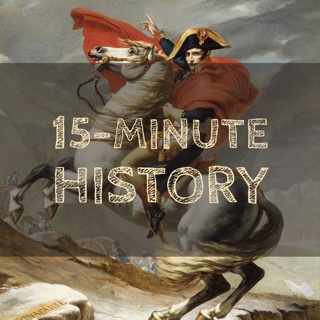
Sketches in History | A Discovery in the Sand
The 15-Minute History Podcast team brings you a new segment, just for kids, called Sketches in History, where history isn’t just a story—it’s an adventure. Join Lottie Archer as she dives into her extraordinary notebook where sketches from history come to life.In this episode, she travels to ancient sands in the deserts of Egypt. She can see two men kneeling near a dark entrance on the brink of a major discovery. Your kids will learn about perseverance and witness one of the greatest historical discoveries in history. Listen and subscribe to the 15-Minute History podcast to hear Sketches in History every other Thursday. Got a favorite historical moment? Share it with us at 15minutehistory@gmail.com, and it might just make its way into the notebook!Until then, remember that history is just a page away.
3 Apr 8min

Genius | Michelangelo Buonarroti (Republish)
During the next few weeks, the 15-History Podcast team is taking a break and bringing you some of their favorite previous episodes. This episode originally aired on November 16, 2020. Join us as we teach you about the genius of Michelangelo Buonarroti, his timeless works of art, and the legacy he left behind.
31 Mars 12min

Pop Quiz | Blurring the Lines
This week, Jon got to ask Joe about the morality of a military attacking civilian targets in war. His answer was very thought-provoking!
27 Mars 7min

"Hatched from a Cannon-Ball" | A Discussion on the Unification of Germany
Join us for a conversation about the ideas behind Germany's unification, how that pivotal moment in world history shaped decades to come, and its legacy that the German people still confront today.
24 Mars 40min

Sketches in History | To the Skies
The 15-Minute History Podcast team brings you a new segment, just for kids, called Sketches in History, where history isn’t just a story—it’s an adventure. Join Lottie Archer as she dives into her extraordinary notebook where sketches from history come to life.In this episode, she travels to a sandy beach on December 17, 1903. She can see two men next to a strange machine. Your kids will learn about innovation and witness the birth of modern aviation.Listen and subscribe to the 15-Minute History podcast to hear Sketches in History every other Thursday. Got a favorite historical moment? Share it with us at 15minutehistory@gmail.com, and it might just make its way into the notebook!Until then, remember that history is just a page away.
20 Mars 9min

"Hatched from a Cannon-Ball" | The Unification of Germany
The creation of a united, powerful Germany completely reshaped European power politics in the late 19th century. But how did it happen? What was the character of that new country, and did it reflect older ideas and values of its Prussian ancestor? Join us as we consider the creation of a country that created so much art and technology but also violence and death. Was its formation a good idea or a bad idea?
17 Mars 16min

Pop Quiz | The Federal Reserve (and some Conspiracies?)
Join us every other week for a Pop Quiz! This week, Joe asked me about the Federal Reserve, how it works, and whether or not it's run by reptilian aliens.Well, maybe not the last one, but we do get into a conversation about the important--and dangerous--role the Federal Reserve plays in American finance today.
13 Mars 6min

Engines of Change | A Discussion on Steam Power and the Effects of Industrialization
Join us as we explore the history of the steam engine, its impact on industrialization, and how both have translated into the modern age.
10 Mars 31min




















